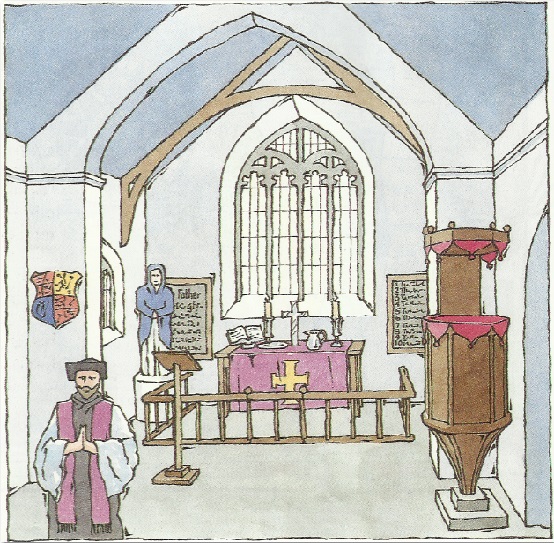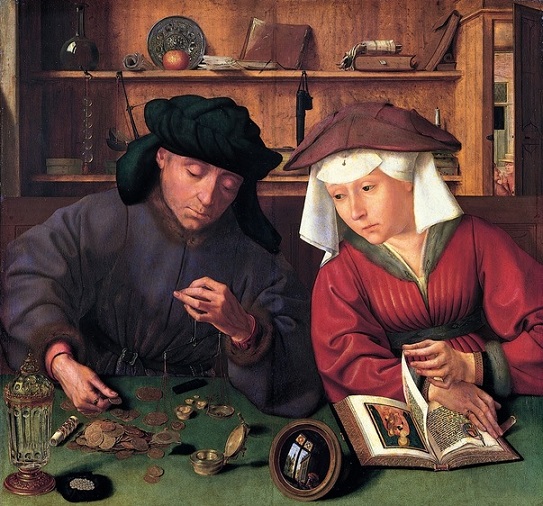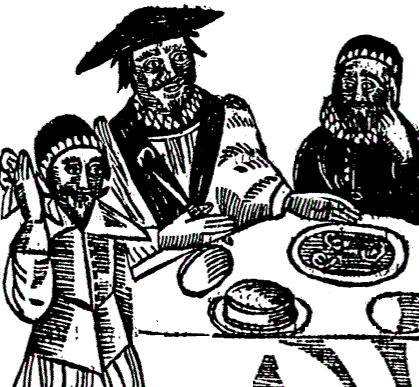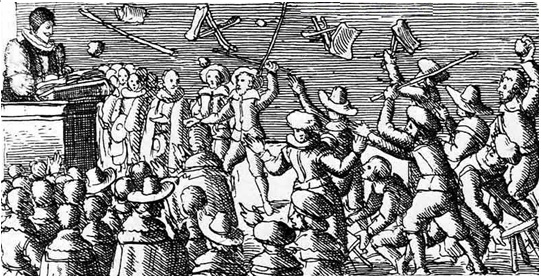
The Causes of the Civil War

Introduction
The main issues of the sixteenth century in England had been the power of the king, and arguments about religion. In the seventeenth century, these issues caused a civil war.
After you have studied this webpage, answer the question sheet by clicking on the 'Time to Work' icon at the top of the page.
Links:
The following websites will help you research further:
Causes of the Civil War:
•
BBC KS3 Bitesize activity game and
excellent simple
video •
H2G2
•
Active History Game - fun!
• a VERY difficult overview of the
historiography -
from the King Edward VI Grammar School, Chelmsford, website
!
William Laud and Religion
Many MPs were Puritans (extreme Protestants). They wanted the country to be more Protestant.
But after the Gunpowder Plot (1605), people were afraid that Catholics were becoming powerful again. In 1625, King Charles I married Henrietta Maria, a Roman Catholic from France.
In 1633, William Laud became Archbishop of Canterbury. Laud did not make church services more Protestant. Instead, he told ministers to put the Communion table back at the east end of the church, and to decorate it with cloths, candles and a cross. People were told to bow at the name of Jesus.
Laud's religious rules made many people angry. To the Puritans, they were no better than superstition and idol-worship.
A church in the time of Archbishop Laud.
Compare this picture with the drawings of churches in 1533 and 1570.
Were Laud's changes really a return to the Catholic religion?

William Noy and Taxation
For almost a century, prices had been rising steadily.
For many, the rise in prices caused great hardship. Poor people were angry about inflation, and they blamed the king.
At the same time, landowners (including the king) who collected rents, were also affected. Their incomes fell behind the cost of living. As a result, Charles was always short of money.
Charles did not ask Parliament to give him more money. Instead, he asked a clever lawyer called William Noy to discover old, forgotten laws and taxes.
People were angry about the tricks Charles used to raise money. The four most annoying taxes were:
1 Knighthoods
A law of 1278 said that anyone who earned more than £40 a year had to become a knight. In the Middle Ages, £40 was a huge sum of money. In the seventeenth century, however, many ordinary people earned more than £40 a year and so were forced to pay money to become a knight.
2 Forest laws
In the Middle Ages, it was against the law to take land that was part of a royal forest. Charles fined anyone who had taken royal land.
3 Monopolies
Charles sold people the right to be the only trader in a wide range of goods – for example, salt, soap, currants and mousetraps. The traders then raised prices and made huge profits.
4 Ship money
In the Middle Ages, people who lived in seaports had paid a tax to build ships for the king's navy in times of war. Charles not only revived this old tax, but also made all towns pay it – even if they were miles inland and the country was at peace! In 1636 the MP John Hampden refused to pay ship money.

The rise in prices did not ruin everyone – it made merchants and businessmen very wealthy. How do you think this change in the balance of wealth affected the balance of society?
Divine Right – Power
Charles did not use the ordinary courts, and trial by jury, to enforce his out-of-date laws. He used his private Court of the Star Chamber, where there was no jury, and where the judges were the king's own ministers.
Charles also used the Court of the Star Chamber to punish Puritans. In 1637 a Puritan called William Prynne was fined £5,000 and imprisoned for life. His ears were cut off and his cheeks were branded.
Many people were angry about the Court of the Star Chamber. They said that the king should not have his own court, and that he should follow the law of the land.
Charles believed that his power came directly from God. This is called the Divine Right of Kings. Charles said that it put him above the ordinary laws.
This cartoon shows Laud eating William Prynne's ears, while Prynne holds a bandage to his head. Laud did not really eat Prynne's ears. The cartoon shows us that people were very angry about the way Charles had treated Prynne.

Foreign Policy and War
King James had signed a peace treaty with Spain in 1604, and in 1625 Charles married Henrietta Maria of France. Both France and Spain were Roman Catholic countries. Many Puritans were angry because they wanted Charles to fight `holy wars' against Catholic countries.
And when Charles finally went to war, his foreign policy was a disaster! Attacks on Spain (1625) and France (1627-28) were complete failures – and England ended up at war with both Spain and France.
Now people were angry because Charles could not win the wars he had started!
The Eleven Years' Tyranny
Parliament complained to the king. In 1628, MPs presented Charles with the Petition of Right. It said that the king had no right to raise taxes without Parliament's consent, or to imprison people without a fair trial.
Instead of listening, Charles sent Parliament away. Between 1629 and 1640 he ruled by himself without a parliament. People were angry and called this time 'the Eleven Years' Tyranny'.
Royal favourites
The king gave power and money to his advisers – men such as George Villiers, the Duke of Buckingham. The way Charles treated his royal favourites made many people angry.
One of Charles's chief advisers was Thomas Wentworth, the Earl of Strafford. As Lord Deputy of Ireland, Strafford had used the army to enforce Charles's laws. People were alarmed when Charles recalled him to England in 1639. They were afraid that Strafford was going to use the same methods in England as he had done in Ireland.
The Bishops' Wars
In 1637, Laud tried to make the people of Scotland obey his Church of England rules. The result was the Bishops' Wars. The Scots rebelled and invaded the north of England.
The war against Scotland was not very dangerous, but it was expensive. In 1640 the king was forced to bring back Parliament to ask them to give him money for the war.
The Scots rebelled when Laud tried to force them to use the English prayer book.

The Grand Remonstrance
The MPs were led by a lawyer called John Pym. They refused to grant any money until the king promised to listen to their complaints.
In November 1641, Parliament presented a Grand Remonstrance (big protest) against Charles's taxes, courts and religious rules. The Star Chamber was abolished. In addition, Parliament tried to reduce the power of bishops, to choose the king's ministers and to control the army. The Earl of Strafford and William Laud were found guilty of treason and executed.
The last straw
The final straw came on 4 January 1642. Charles tried to arrest John Pym, John Hampden and three other MPs: Hazelrigg, Holies and Strode. They escaped, but people were very angry that Charles had tried to arrest the five MPs.
Charles left London. In August, he declared war on Parliament.